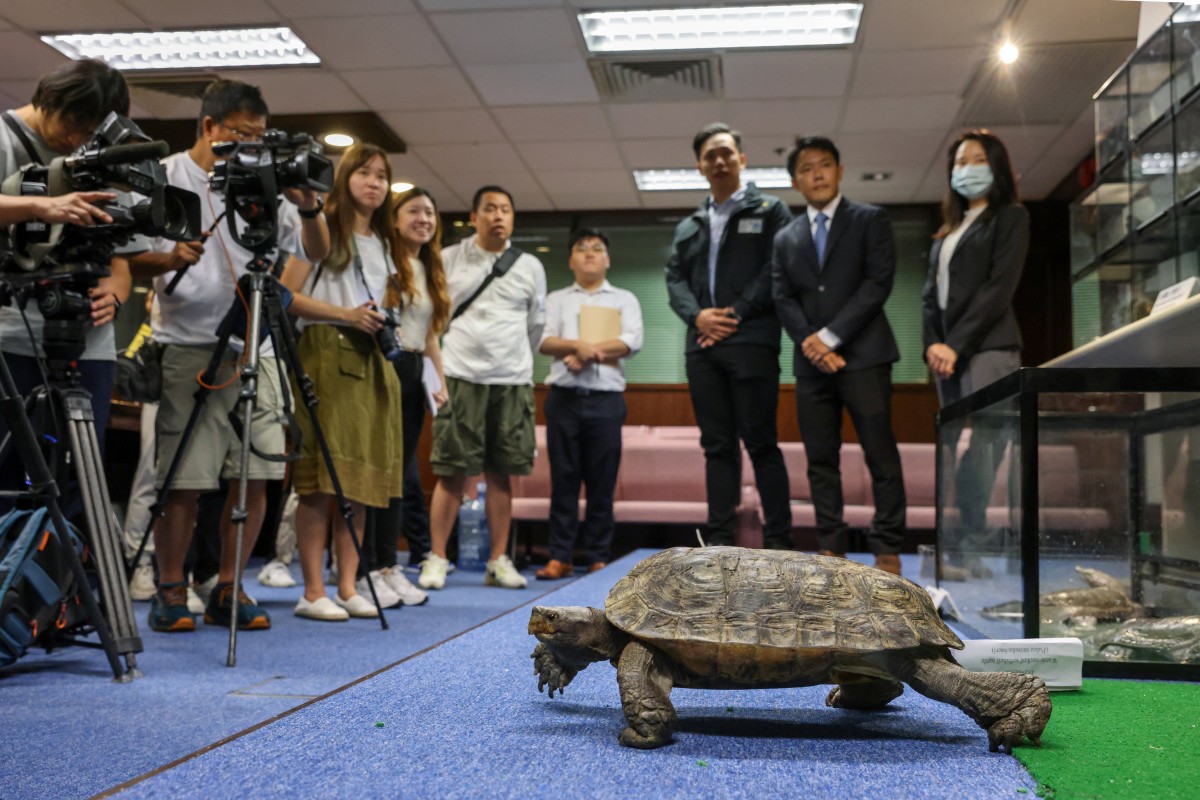 |
| A giant Asian pond turtle at an Agriculture, Fisheries and Conservation Department press conference. |
In Hong Kong, the illegal wildlife trade is thriving despite the implementation of stricter laws targeted at stopping syndicates from making millions of dollars off of endangered species. According to Amanda Whitfort, a lawyer for the environmental group ADM Capital Foundation, a law known as the Organized and Serious Crime Ordinance was revised two years ago to deal with certain crimes related to wildlife trafficking. The amendment, which was praised as "historic" and "landmark" at the time, enables authorities to secure court orders to obtain documents essential to their investigations that they would otherwise not be able to acquire. It also allowed judges to seize the profits of wildlife crimes and administer harsher punishments. However, the changes have so far proven useless. Whitford further added that law enforcement officers claim there is no evidence proof of organized crime inspite of the extremely large seizures. In 2020 and 2021, more than 676 tonnes of endangered species estimated to be worth more than HK$221 million were seized by customs. Confiscations included 26 tonnes of smuggled dried shark fins in April and May 2020 and 4.12 tonnes of red sandalwood in January 2022. In July, authorities seized a shipment of about sixty pieces of hippopotamus ivory and approximately 3,300 live tortoises, among other things, worth HK$2 million. According to Dr. Astrid Andersson, a wildlife forensics expert from University of Hong Kong, for a relatively small space, the city confiscated huge volumes of endangered animals and their body parts.
 |
| Amanda Whitford |
The ADM Capital Foundation said it discovered that authorities had failed to use their new jurisdictions in a meeting with the Customs and Excise Department in February. Whitford, on the other hand, indicated that the situation was brought to her a month later during a meeting of the government's interdepartmental task force on wildlife crime. This task force is comprised of customs, the Agriculture, Fisheries and Conservation Department (AFCD), Environment Bureau, and the police. When called for comment, customs and the AFCD cut short of revealing whether the ordinance had ever been enforced in its wildlife smuggling cases, while the police refused to comment. A closer investigation of the ordinance disclosed that only customs or the police have the authority enforce it, not the AFCD. It is known that after customs make confiscations at the borders, the case is given within a day or two to the AFCD, which handles wildlife. This leaves the customs and police unable to investigate the cases.
 |
| Staff at a pet shop in Prince Edward. |
I very much feel that there should be a strong collaboration between the customs, police, and the AFCD in the battle to curb the illegal wildlife trade in Hong Kong. With the amendment of the Organized and Serious Crime Ordinance in 2021, it looked like there was going to be a game changer but it seems that neither the customs nor the police are doing their part in investigating the cases involving seizures of endangered species in Hong Kong. Despite having the authority to enforce the ordinance, the customs and the police simply hand over the case to the AFCD after confiscating such illegal contraband. This is simply not the way to combat the illegal wildlife trade. Members of customs, police, and AFCD should investigate such cases together in order to identify key figures in wildlife smuggling rings and come up with solutions in prosecuting such figures. Head of protection of endangered species at WWF-Hong Kong Brian Gonzales proposed the task force should establish specially designed units committed to particular cases. He further added that this would allow the task to delve into the money trails through the ordinance so that the government of Hong Kong could make use of its anti-money laundering jurisdictions against wildlife crimes. Dr. Andersson stated that she and other scientists are developing and providing tools for the police such as a rapid test that verifies the species of shark fins within a few hours. However, she also argued that boosting enforcement is essential. I strongly think that suggestions from these two people should be taken into consideration in improvising Hong Kong's battle against the illegal wildlife trade. It is highly essential that a joint collaboration between the authorities and wildlife and conservation experts is needed.
No comments:
Post a Comment